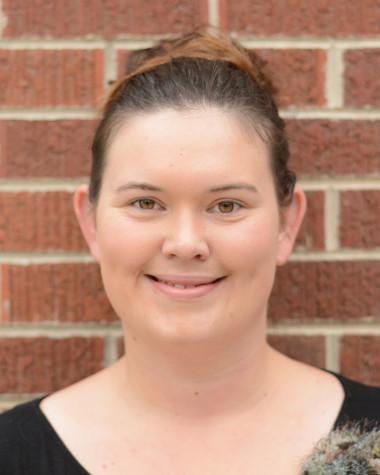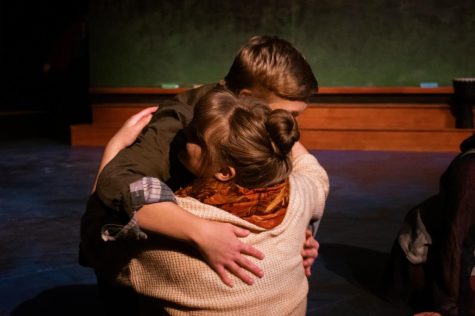Curse be damned; ‘Macbeth’ opens without a hitch
March 14, 2014

Knock on wood, cross your fingers, turn around three times and hope that the curse of “Macbeth” does not strike again.
From all of the stage lights going out, to other odd onstage mishaps, “Macbeth” has become that one word not to be said in the theater or it might bring on a curse that is sure to wreak havoc.
Since the first performance of “Macbeth” in 1610, it has been surrounded by odd occurrences and strange mishaps.
The curse is said to have been started by Shakespeare using spells of witchcraft while writing the play. This led to a series of unfortunate events occurring during different productions. According to Historic Mysteries, the first production of “Macbeth” was struck by the curse when the boy playing Lady Macbeth took ill and died right before going on stage. This supposedly led to Shakespeare himself performing the role.
From there, there have been reported occurrences of riots breaking out at the 1849 performance in New York which killed 30, Laurence Olivier nearly getting struck with a heavy weight that suddenly fell from above in the 1939 performance and Charlton Heston suffering burns on his legs, which was later discovered to be caused by kerosene on his tights, in the 1953 production.
Teko Dumoulin, a senior theater major who is playing Macbeth, said, “Everyone who’s done enough theater has stories about the curse. I have stories about people saying just the name of the play during productions and horrible things happening, people almost dying. [I’ve] never had any serious injuries happen but really close shaves and weird coincidences.”
While the curse has not proved to be a problem for the EWU production of “Macbeth,” it is still treated with respect by those involved with the production.
Dumoulin continued to explain that it is hard when doing an art form, like theater, that relies on being in the moment to not discount anything that can have negative effects.
Dumoulin said, “While I might not personally play into superstitions, I do abide by them.”
The curse has especially affected the role of Lady Macbeth.
Nichole Meyer, who plays Lady Macbeth, said, “I believe that the curse is a self-fulfilling prophecy. If you think bad things will happen, they will. During ‘The Underpants’ last year someone said ‘Macbeth’ during rehearsal, and the next day, a set piece almost fell on my head.”
Past performers playing the role have been chased off the stage by audiences who believed she really was a killer, an actress fell 15 feet off the stage and another actress was strangled by a fellow actor.
Jeffrey Sanders, a lecturer in the theater department and director of “Macbeth,” explained more than the curse has haunted him. He has participated in three productions of the play and this is his first time directing it.
Sanders said, “I was always attracted to [‘Macbeth’s’] otherness. It’s a hard play to categorize; obviously, it’s a tragedy. [‘Macbeth’s’] journey is sometimes one of the hardest Shakespearian protagonists to put your finger on.”
Sanders explained that while he has participated in the production multiple times in the past, there is always more to the play and the characters. He especially has reached a greater understanding of the production. With the recent addition of Macbeth‘s son to his family, the themes of “Macbeth” and the loss of one’s family has become more tangible to him.
Sander’s explained that thespians are very ritualistic and like to follow certain things. With the curse of “Macbeth,” it is believed that it is bad luck to say the name of the play, making it often referred to as “The Scottish Play,” “Macbee” or even just “that play.”
Sanders said, “When you’re doing ‘Macbeth’ it’s OK to say Macbeth; it’s the one time [and] one pass. In the past Sara [Goff] Sander’s wife and associate professor in the theater department] and I have been diligent about if anyone ever said that play we would make them go outside the theater, make them turn three times, spit and cuss and then ask if they can re-enter. I always highly, highly adhere to the curse.”
With the respect for the curse of “Macbeth” from those involved with EWU’s production, the show went off without a hitch.


















